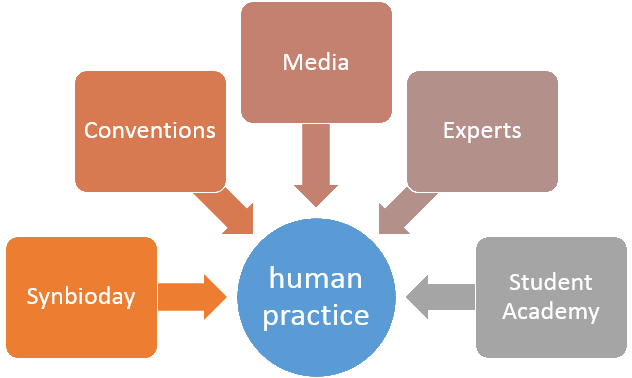Team:Bielefeld-Germany/HumanPractice
From 2013.igem.org
| Line 63: | Line 63: | ||
<br> | <br> | ||
<p align="justify"> | <p align="justify"> | ||
| - | Human Practice is an important aspect when taking part in iGEM. You have the chance to talk about your project with people with different backgrounds in | + | Human Practice is an important aspect when taking part in iGEM. It implies the opportunity to evaluated one’s project regarding biosafety, ethical and practical issues. You have the chance to talk about your project with people with different backgrounds in Synthetic Biology like public, pupils or experts who can be politicians or scientists who work correspondingly in the same field of science. It is important to seek advice from these interdisciplinary experts to develop new ideas or optimize the existing ones. Our expert is Dr. Falk Harnisch, a leading scientist in bioelectric catalysis and bioelectrotechnology who works at the department of environmental microbiology at the Helmholtz-Zentrum for environmental research in Leipzig, Germany. We did a comprehensive interview with him via Skype and invited him to our institution. Because Synthetic Biology is not well accepted in Germany we arranged a “Synbioday” where we explained our project and Synthetic Biology to increase public perception. This was coordinately carried out in five German towns where the five different participating German iGEM teams were located. We also planned and execute a student academy where we educated talented high-school students about Synthetic Biology. We prepared and carried out a special planned course over a whole week with them. In addition we participated at three conventions where we published and discussed our project and got very positive feedback. This positive feedback is also reflected in many media appearance like reviews in journals like the “Mumbai Mirror”, in TV like a spot at “WDR” or in the radio at “Radio Bielefeld”. All in all we did a lot of human practice and had a lot of fun besides the wet lab to explain our project to the public |
</p> | </p> | ||
Revision as of 02:47, 5 October 2013
Human Practice
Overview
Human Practice is an important aspect when taking part in iGEM. It implies the opportunity to evaluated one’s project regarding biosafety, ethical and practical issues. You have the chance to talk about your project with people with different backgrounds in Synthetic Biology like public, pupils or experts who can be politicians or scientists who work correspondingly in the same field of science. It is important to seek advice from these interdisciplinary experts to develop new ideas or optimize the existing ones. Our expert is Dr. Falk Harnisch, a leading scientist in bioelectric catalysis and bioelectrotechnology who works at the department of environmental microbiology at the Helmholtz-Zentrum for environmental research in Leipzig, Germany. We did a comprehensive interview with him via Skype and invited him to our institution. Because Synthetic Biology is not well accepted in Germany we arranged a “Synbioday” where we explained our project and Synthetic Biology to increase public perception. This was coordinately carried out in five German towns where the five different participating German iGEM teams were located. We also planned and execute a student academy where we educated talented high-school students about Synthetic Biology. We prepared and carried out a special planned course over a whole week with them. In addition we participated at three conventions where we published and discussed our project and got very positive feedback. This positive feedback is also reflected in many media appearance like reviews in journals like the “Mumbai Mirror”, in TV like a spot at “WDR” or in the radio at “Radio Bielefeld”. All in all we did a lot of human practice and had a lot of fun besides the wet lab to explain our project to the public
 "
"

